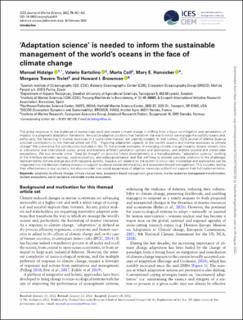| dc.contributor.author | Hidalgo, Manuel | |
| dc.contributor.author | Bartolino, Valerio | |
| dc.contributor.author | Coll, Marta | |
| dc.contributor.author | Hunsicker, Mary E. | |
| dc.contributor.author | Travers-Trolet, Morgane | |
| dc.contributor.author | Browman, Howard | |
| dc.date.accessioned | 2022-09-05T11:43:23Z | |
| dc.date.available | 2022-09-05T11:43:23Z | |
| dc.date.created | 2022-06-10T09:54:17Z | |
| dc.date.issued | 2022 | |
| dc.identifier.citation | ICES Journal of Marine Science. 2022, 79 (2), 457-462. | en_US |
| dc.identifier.issn | 1054-3139 | |
| dc.identifier.uri | https://hdl.handle.net/11250/3015782 | |
| dc.description.abstract | The global response to the challenge of increasingly rapid and severe climate change is shifting from a focus on mitigation and remediation of impacts to a pragmatic adaptation framework. Innovative adaptive solutions that transform the way in which we manage the world’s oceans and, particularly, the harvesting of marine resources in a sustainable manner, are urgently needed. In that context, ICES Journal of Marine Science solicited contributions to the themed article set (TS), “Exploring adaptation capacity of the world’s oceans and marine resources to climate change”.We summarize the contributions included in this TS that provide examples of emerging climate change impacts, assess system risks at subnational and international scales, prove and evaluate different adaptation options and approaches, and explore societal and stakeholder perceptions. We also provide some “food for thought" on possible future developments in a transdisciplinary “adaptation science” working at the interface between ecology, socio-economics, and policy-governance, and that will have to provide concrete solutions to the challenges represented by climate-change and anthropogenic activity. Success will depend on the extent to which new knowledge and approaches can be integrated into the decision-making process to support evidence-based climate policy and ecosystem-based management. This includes testing their effectiveness in real systems, but also consider how social acceptance of adaptive measures will/will not support their full implementation | en_US |
| dc.language.iso | eng | en_US |
| dc.rights | Navngivelse-DelPåSammeVilkår 4.0 Internasjonal | * |
| dc.rights.uri | http://creativecommons.org/licenses/by-sa/4.0/deed.no | * |
| dc.title | 'Adaptation science' is needed to inform the sustainable management of the world's oceans in the face of climate change | en_US |
| dc.title.alternative | 'Adaptation science' is needed to inform the sustainable management of the world's oceans in the face of climate change | en_US |
| dc.type | Peer reviewed | en_US |
| dc.type | Journal article | en_US |
| dc.description.version | publishedVersion | en_US |
| dc.source.pagenumber | 457-462 | en_US |
| dc.source.volume | 79 | en_US |
| dc.source.journal | ICES Journal of Marine Science | en_US |
| dc.source.issue | 2 | en_US |
| dc.identifier.doi | 10.1093/icesjms/fsac014 | |
| dc.identifier.cristin | 2030720 | |
| dc.relation.project | EC/H2020/817578 | en_US |
| dc.relation.project | EC/H2020/773713 | en_US |
| dc.relation.project | Havforskningsinstituttet: 83741 | en_US |
| dc.relation.project | EC/H2020/869300 | en_US |
| cristin.ispublished | true | |
| cristin.fulltext | original | |
| cristin.qualitycode | 2 | |

